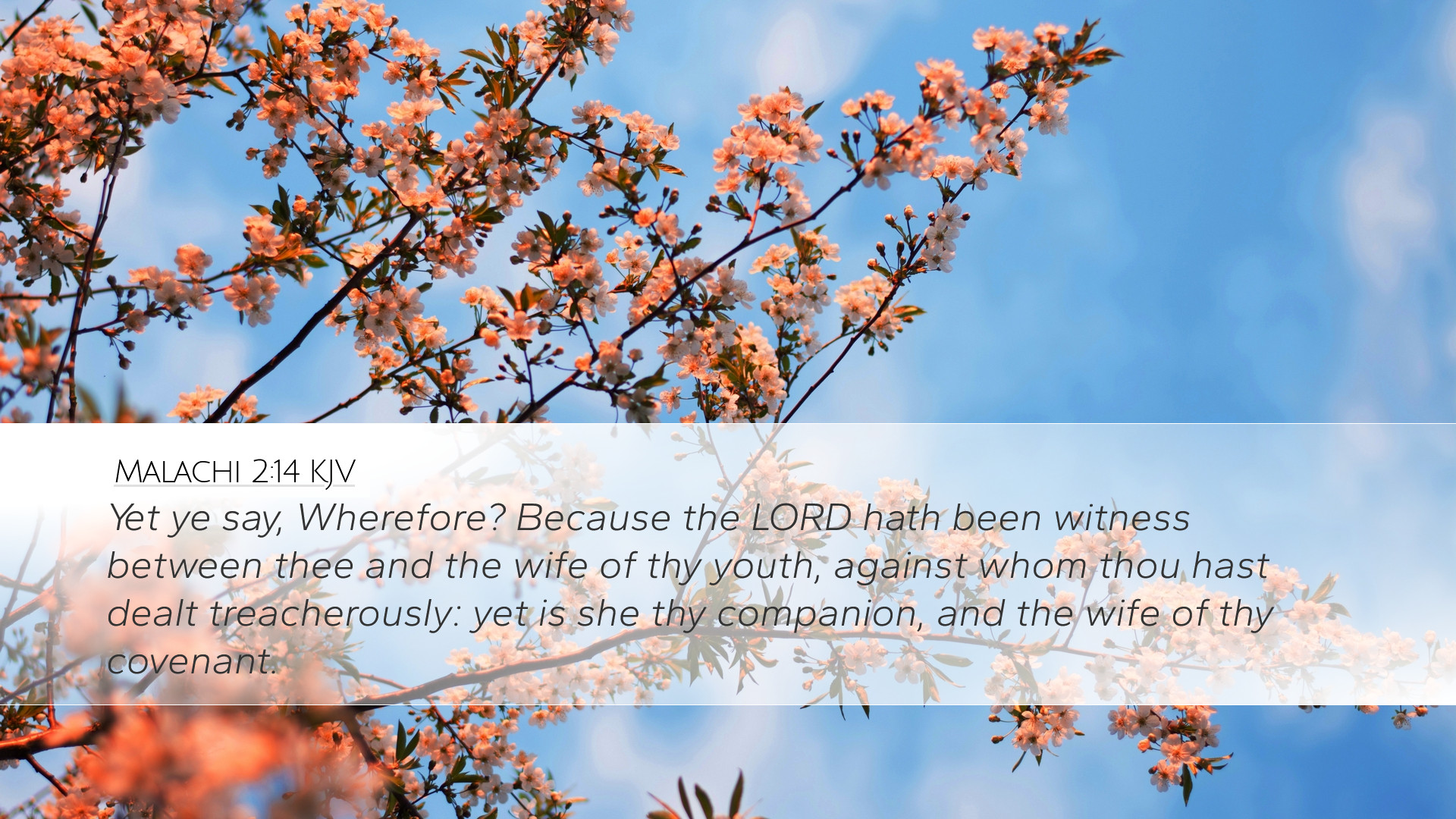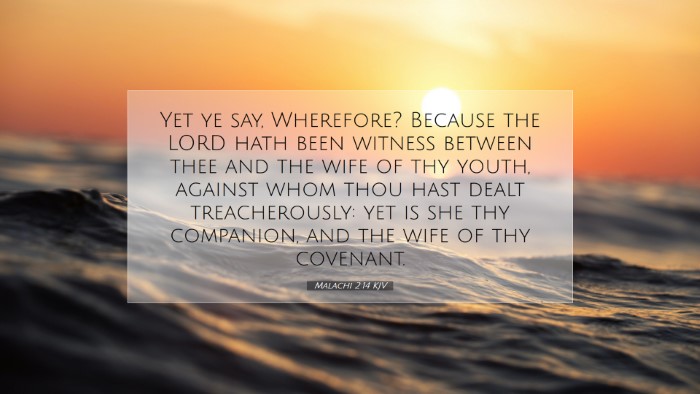Old Testament
Genesis Exodus Leviticus Numbers Deuteronomy Joshua Judges Ruth 1 Samuel 2 Samuel 1 Kings 2 Kings 1 Chronicles 2 Chronicles Ezra Nehemiah Esther Job Psalms Proverbs Ecclesiastes Song of Solomon Isaiah Jeremiah Lamentations Ezekiel Daniel Hosea Joel Amos Obadiah Jonah Micah Nahum Habakkuk Zephaniah Haggai Zechariah MalachiMalachi 2:14
Malachi 2:14 KJV
Yet ye say, Wherefore? Because the LORD hath been witness between thee and the wife of thy youth, against whom thou hast dealt treacherously: yet is she thy companion, and the wife of thy covenant.
Malachi 2:14 Bible Commentary
Commentary on Malachi 2:14
Malachi 2:14 states, "Yet ye say, Wherefore? Because the LORD hath been witness between thee and the wife of thy youth, against whom thou hast dealt treacherously: yet is she thy companion, and the wife of thy covenant."
Introduction
This verse from the Book of Malachi addresses the spiritual and moral state of Israel at the time. It raises important themes about fidelity in marriage, the sanctity of covenant relationships, and God's witness to human actions. The prophet Malachi is calling out the treachery experienced in the marital relationships of the people of Israel, emphasizing how this reflects their relationship with God.
Contextual Background
Historical Context: Malachi prophesied during a period of spiritual decline in Israel, post-exile, where the people had returned to Jerusalem but often fell back into old habits of disobedience. The message is aimed at the priests and people who had become complacent in their faith.
Thematic Implications: The marital covenant is often a metaphor for God's covenant with His people. The dishonor in the marriage covenant mirrors their dishonor in their covenant relationship with God. Understanding this connection helps illuminate the depth of Malachi's message.
Insights from Commentaries
Matthew Henry's Commentary
Matthew Henry emphasizes the seriousness of dealing treacherously with one's spouse. He points out that God witnesses all actions and emphasizes the solemnity of the marriage covenant. Henry notes that the wife of one’s youth represents both a companion and a partner in covenant made before God, highlighting the importance of faithfulness in relationships.
- Treachery in Relationships: Henry identifies that treachery is not only a personal failing but also a sin against the covenant made both with the spouse and with God.
- God as Witness: He underscores the phrasing "the LORD hath been witness," emphasizing that God is omnipresent and observes all human relationships, thereby reinforcing the sanctity of the marriage covenant.
- The Importance of Companionship: The term “companion” denotes a deep relationship that is meant to reflect loyalty and understanding, which is compromised by dishonesty.
Albert Barnes' Notes on the Bible
Albert Barnes provides a detailed examination of how the Israelites have broken faith with their wives and reflects on the broader implications of faithlessness. Barnes expounds on the social and spiritual ramifications of divorce and unfaithfulness.
- Witness of the Lord: Barnes highlights that God's witness is a reminder that He holds people accountable for their actions, particularly in marriage. They can neither hide from nor escape this divine oversight.
- Covenant and Faithfulness: He connects the concept of marital fidelity with God's faithfulness to His covenant with Israel, reinforcing that unfaithfulness in marriage signifies a larger breach of covenant with God.
- The Role of the Wife: Barnes emphasizes the importance of the “wife of thy youth” as a representation of one’s initial love and commitment, suggesting that as relationships mature, so should the love and loyalty within them.
Adam Clarke's Commentary
Adam Clarke offers a theological insight into the implications of Malachi's message, discussing the covenant relationship extensively.
- Covenant Language: Clarke discusses the significance of the term "covenant" and argues that it requires mutual loyalty, respect, and love. The spiritual implications of breaking such a covenant are profound.
- Reproof to the Priests: Clarke notes that this passage serves as a reproof not only to individual Israelites but particularly to the priests who were supposed to lead by example in their fidelity to God's commandments.
- Implications of Treachery: He warns that treachery, particularly in marriage, leads to societal decay, a theme echoed throughout the prophetic texts.
Application for Today
This verse serves as a significant reminder for contemporary readers about the importance of fidelity in marriage and the consequences of betrayal. It encourages individuals and leaders within the community to uphold the sanctity of marriage and understand it as a reflection of their relationship with God. Furthermore, it serves as a warning against complacency in spiritual matters, urging believers to maintain a sincere and honest relationship with both God and one another.
Conclusion
Malachi 2:14 encapsulates critical themes that resonate through scripture, urging faithfulness in marriage as a divine principle. The insights from Matthew Henry, Albert Barnes, and Adam Clarke provide a rich tapestry of understanding that encourages deeper reflection among pastors, students, and scholars alike. This text reminds us of the serious nature of our commitments and the ever-watchful nature of God concerning our relationships.


